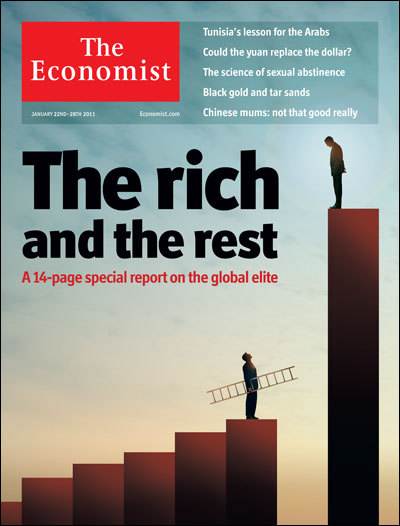なかなか読み応えのある記事が最近多いEconomistですが、1月20日版は目を引く題名もさることながら、世界を大きく俯瞰するって意味で面白い特集満載でした。 ダボス会議に出席するリーダーへの現状整理、を強く意識した編集内容だったんだろうなー、と思いながら一気に読了。
先進国政府だからこそ"Social inequality"に対する改革を推進すべき(P11: The rich and the rest) 、"Brainy People"へ集まる富と影響力(P56:The few) 、inequalityが国と国との相互作用として(国内・国外両方へ影響を与えるダイナミズム(P69: Unbottled Gini) 、「規制緩和に対する政府の意思」こそが経済危機(サブプライム危機)と所得格差拡大の相関関係を規定する(P86:The beautiful and the damned)
などなど。 
日本に住み続けると「同質化」の弊害とでも言うんでしょうか、この手の記事がピン!っと自分に入り込んでくる感覚が薄れてくるような気がしてなりません。ただ、この手の議論、最近の日本の記事やブログもかなり鋭く切り込んでいるような気がしてます。
日経ビジネスや日経ビジネスオンラインって英語で発行されるとかなり世界では質の高い出版物になるような気がするんだけどなー。
逆に言うと、日本にいても世界を知ることはできるけど、それは「知る」だけであって「感じる」こととは違うんだよなあ。
ネットで情報収集してると頭でっかちになっちゃうように、この手の情報ばっかり読んでると、日本に居ることだったり、日本そのものに対する危機感がどんどん増してくるから恐ろしい。 もっと、感じなきゃ。。
 |
(以下はオンライン版に掲載されてるいくつかの記事からメモ的に抜粋)
<The rich and the rest>
the right way to combat inequality and increase mobility is clear. First, governments need to keep their focus on pushing up the bottom and middle rather than dragging down the top: investing in (and removing barriers to) education, abolishing rules that prevent the able from getting ahead and refocusing government spending on those that need it most. Oddly, the urgency of these kinds of reform is greatest in rich countries, where prospects for the less-skilled are stagnant or falling. Second, governments should get rid of rigged rules and subsidies that favour specific industries or insiders. Forcing banks to hold more capital and pay for their implicit government safety-net is the best way to slim Wall Street’s chubbier felines. In the emerging world there should be a far more vigorous assault on monopolies and a renewed commitment to reducing global trade barriers—for nothing boosts competition and loosens social barriers better than freer commerce.
<More millionaires than Austrians>
The global wealth pyramid has a very wide base and a sharp point. The richest 1% of adults control 43% of the world’s assets; the wealthiest 10% have 83%. The bottom 50% have only 2%. This suggests a huge disparity of influence. The wealthiest tenth control the vast bulk of the world’s capital, giving them a lot of say in funding businesses, charities and politicians. The bottom 50% control hardly any capital at all.
That said, this huge group includes people in quite different circumstances. Many young people in rich countries have no assets and a wallet full of maxed-out credit cards. Technically, their debts make them poorer than African peasants who have nothing. But they enjoy a much higher standard of living and far better prospects. In Denmark and Sweden a startling 30% of the population say their debts exceed their assets, but few go hungry. Many have simply taken out large student loans which an indulgent government allows them to repay very gradually.
<unloading the loaded>
The financial crisis hurt sales of luxury goods, which fell by 8% in 2009. But Bain, a consultancy, estimates that in 2010 they grew by 10% worldwide, and by an astounding 30% in China, where the boom barely faltered. In the West the rich have cut back on ostentatious baubles and instead gone for experiences, such as yoga retreats in India or personal coaches to teach them about Buddhism, says Milton Pedraza of the Luxury Institute, a consultancy. China’s new millionaires have no such qualms. One retailer there started selling Smart cars covered in Swarovski crystals last year.
What the rich lack is time, says a former personal assistant to celebrities. They may decide to go for a weekend in Thailand on the spur of the moment, and the personal assistant has to make it happen. Another popular time-saver is a medical concierge service. PinnacleCare, for example, will send a doctor “to your home, your office [or] your ski chalet”, says Bruce Spector, the founder.